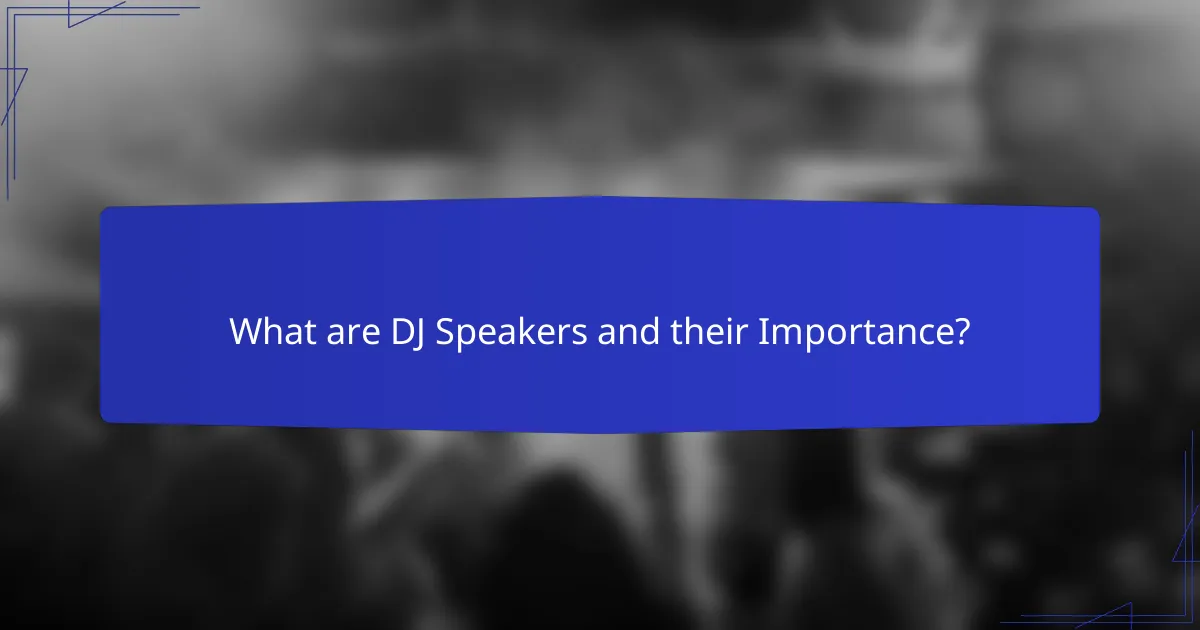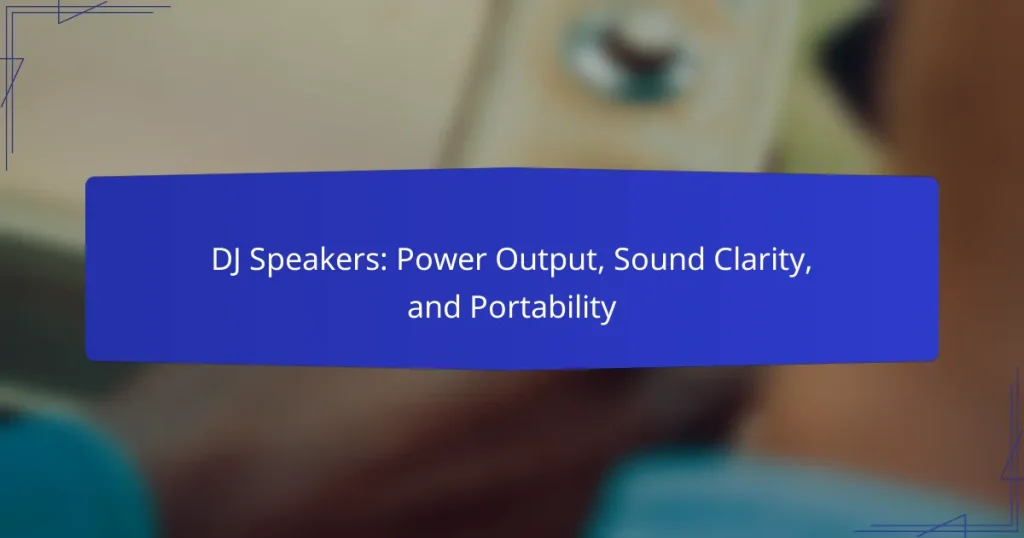DJ speakers are specialized audio devices essential for DJs to amplify sound during live performances and events. This article explores the key features of DJ speakers, including their power output, sound clarity, and portability. It highlights the importance of these speakers in delivering high-quality audio to large audiences, ensuring that music is heard clearly at various volumes. Additionally, the article discusses the design elements that enhance bass response and durability, allowing for frequent use across different venues. Overall, DJ speakers play a crucial role in creating an immersive audio experience that engages audiences effectively.

What are DJ Speakers and their Importance?
DJ speakers are specialized audio devices designed to amplify sound for live performances and events. They are crucial for DJs to deliver high-quality audio to large audiences. These speakers provide powerful sound output, ensuring that music is heard clearly at various volumes. Sound clarity is essential for maintaining the quality of music, especially in genres with intricate details. Additionally, DJ speakers are often portable, allowing DJs to easily transport them to different venues. Their design typically includes features like enhanced bass response and durability to withstand frequent use. The importance of DJ speakers lies in their ability to create an immersive audio experience, which is vital for engaging audiences during performances.
How do DJ Speakers differ from regular speakers?
DJ speakers differ from regular speakers primarily in their design and functionality. DJ speakers are engineered for high power output to handle loud environments. They often feature enhanced bass response to deliver impactful sound during performances. Regular speakers typically focus on balanced sound across frequencies for general listening. DJ speakers also prioritize portability with lightweight materials and rugged designs for easy transport. They often include features like built-in amplifiers and equalizers tailored for live sound applications. This makes them more suitable for events and parties compared to regular speakers, which are designed for home use.
What key features define DJ Speakers?
DJ speakers are defined by their power output, sound clarity, and portability. Power output is crucial as it determines the loudness and ability to fill a space. Typically, DJ speakers range from 200 watts to over 2000 watts. Sound clarity ensures that music is reproduced accurately without distortion. High-quality drivers and tweeters enhance this clarity, especially at higher frequencies. Portability is essential for DJs who transport equipment frequently. Lightweight designs and built-in handles facilitate easy movement. Additionally, features like Bluetooth connectivity and rugged construction are common in modern DJ speakers. These attributes collectively enhance the DJ experience, making them suitable for various environments.
Why is sound quality crucial for DJ Speakers?
Sound quality is crucial for DJ speakers because it directly affects the listening experience. High sound quality ensures clarity in music, allowing every beat and note to be heard distinctly. This clarity is essential for DJs to mix tracks effectively and maintain the energy on the dance floor. Poor sound quality can lead to distortion, making it difficult for the audience to enjoy the performance. Additionally, well-defined sound quality enhances the overall atmosphere of events, creating a memorable experience. Research indicates that audiences respond more positively to events with high-quality sound, leading to increased engagement and satisfaction.
What role does power output play in DJ Speakers?
Power output is crucial for DJ speakers as it determines the loudness and clarity of sound. Higher power output allows speakers to produce sound at greater volumes without distortion. This is essential in live settings where ambient noise levels are high. DJ speakers typically range from 100 watts to over 2000 watts. For example, a 1000-watt speaker can effectively fill a large venue with sound. Additionally, adequate power output ensures that bass frequencies are delivered with impact. This enhances the overall listening experience for the audience. Therefore, power output directly influences performance quality in DJ setups.
How is power output measured in DJ Speakers?
Power output in DJ speakers is measured in watts. This measurement indicates the amount of electrical power the speaker can handle and convert into sound. Higher wattage typically correlates with increased volume and sound clarity. The power output is often specified as RMS (Root Mean Square) watts, which provides a more accurate representation of continuous power handling. Peak power ratings may also be provided, indicating the maximum power the speaker can handle for short bursts. Measuring instruments, such as wattmeters, are used to determine these values during testing. Accurate power output measurements are essential for ensuring compatibility with amplifiers and achieving optimal performance.
What is the ideal power output for different DJ setups?
The ideal power output for different DJ setups varies based on the venue size and type of event. For small venues or private parties, a power output of 200 to 500 watts is typically sufficient. Medium-sized events, such as club gigs, usually require 500 to 1000 watts for optimal sound. Large venues or outdoor festivals often demand 1000 watts or more to ensure clear audio across a wide area. These power outputs provide the necessary sound pressure levels to overcome ambient noise and deliver a quality listening experience. According to sound engineering standards, adequate power output is crucial for maintaining sound clarity and preventing distortion at higher volumes.
How does sound clarity impact a DJ’s performance?
Sound clarity significantly impacts a DJ’s performance by enhancing the audience’s listening experience. Clear sound allows for precise mixing and seamless transitions between tracks. It enables DJs to identify subtle nuances in the music, such as vocal lines and bass drops. This clarity helps maintain the energy on the dance floor and keeps the audience engaged. Furthermore, high sound clarity reduces listener fatigue, allowing the audience to enjoy longer sets without discomfort. Research indicates that sound clarity can influence audience satisfaction and overall event success. A study by the Audio Engineering Society found that sound quality is a key factor in audience enjoyment at live events.
What factors contribute to sound clarity in DJ Speakers?
Sound clarity in DJ speakers is influenced by several key factors. These include speaker design, driver quality, and frequency response. The design of the speaker affects how sound waves are produced and dispersed. High-quality drivers enhance sound reproduction fidelity. Frequency response indicates the range of sounds a speaker can effectively produce. A wider frequency response typically results in clearer sound. Additionally, the materials used in speaker construction, such as the diaphragm and enclosure, play a significant role in sound clarity. Proper power handling and amplification also contribute to maintaining sound quality at high volumes.
How can sound clarity be optimized in a live setting?
To optimize sound clarity in a live setting, use high-quality speakers designed for clarity. Position speakers at ear level to enhance direct sound perception. Utilize equalization to balance frequencies and reduce muddiness. Implement proper sound absorption materials in the venue to minimize echo. Maintain appropriate speaker distance to avoid phase cancellation. Use directional microphones to capture sound accurately while minimizing background noise. Regularly test sound levels and adjust during sound checks to ensure clarity. These methods are supported by audio engineering principles that emphasize clarity and quality in live sound environments.
What are the advantages of portability in DJ Speakers?
Portability in DJ speakers offers several advantages. First, it allows for easy transport to various venues. DJs can quickly set up and dismantle their equipment. This flexibility is crucial for events like parties and weddings. Additionally, portable DJ speakers often come with built-in batteries. This feature enables outdoor performances without needing power outlets. Lightweight designs also reduce physical strain during transport. Portable speakers can adapt to different environments, enhancing sound quality. Overall, portability increases a DJ’s versatility and efficiency.
How does weight affect the portability of DJ Speakers?
Weight significantly affects the portability of DJ speakers. Lighter speakers are easier to transport and set up. They are often preferred for mobile DJs who need to move frequently. Heavier speakers may provide better sound quality but can be cumbersome. Portability is crucial for events requiring quick setup and teardown. Research indicates that speakers weighing under 30 pounds are ideal for mobility. In contrast, speakers over 50 pounds can hinder ease of transport. Thus, weight directly influences how easily DJs can manage their equipment during events.
What features enhance the portability of DJ Speakers?
Lightweight construction enhances the portability of DJ speakers. Materials like plastic and aluminum reduce overall weight. Compact size also contributes to easy transport. Built-in handles facilitate carrying the speakers. Battery-powered options eliminate the need for power outlets. Integrated wheels allow for smooth movement over various surfaces. Durable casing protects speakers during transit. These features collectively make DJ speakers more user-friendly for mobile setups.
What should you consider when choosing DJ Speakers?
When choosing DJ speakers, consider power output, sound clarity, and portability. Power output determines the volume and overall performance of the speakers. Look for speakers with a higher wattage for larger venues. Sound clarity is crucial for an enjoyable listening experience. Check frequency response specifications to ensure a balanced sound. Portability matters if you frequently transport equipment. Lightweight and compact designs are preferable for ease of movement. Additionally, examine connectivity options for compatibility with your setup. These factors collectively influence the effectiveness and suitability of DJ speakers for your needs.
How do venue size and type influence speaker selection?
Venue size and type significantly influence speaker selection for DJs. Larger venues require speakers with higher power output to fill the space effectively. For instance, a concert hall necessitates robust sound systems that can project sound over long distances. Conversely, smaller venues, like bars or clubs, may only need compact speakers with sufficient clarity and bass response. The type of venue also dictates the acoustic requirements. Outdoor venues often require weather-resistant speakers to withstand environmental factors. In contrast, indoor venues might prioritize sound clarity and fidelity. Research indicates that matching speaker specifications to venue characteristics enhances overall sound quality and audience experience.
What are the best practices for setting up DJ Speakers?
Position DJ speakers at ear level for optimal sound clarity. Ensure speakers are angled towards the audience for even sound distribution. Use speaker stands to elevate the speakers and reduce vibrations. Avoid placing speakers directly against walls to prevent sound distortion. Connect speakers to a quality audio mixer for better control over sound output. Test the sound in the venue before the event to adjust settings as needed. Use appropriate cables to minimize signal loss. Regularly check equipment for functionality to ensure a smooth performance.
How can you troubleshoot common issues with DJ Speakers?
To troubleshoot common issues with DJ speakers, first check the power source. Ensure the speakers are properly plugged in and the outlet is functional. Next, inspect the audio cables for damage or loose connections. Replace any faulty cables as needed. If there is no sound, verify the volume levels on both the speakers and the audio source. Additionally, check if the speakers are muted or if the audio source is set to the correct output. For distortion issues, reduce the volume to see if clarity improves. If problems persist, consult the user manual for specific troubleshooting steps related to the model. Regular maintenance can also prevent many common issues.
DJ speakers are specialized audio devices designed for live performances, characterized by their high power output, sound clarity, and portability. This article explores the importance of DJ speakers, highlighting how they differ from regular speakers and discussing key features that enhance performance, such as power output measurement and sound clarity optimization. Additionally, it addresses the advantages of portability, factors influencing speaker selection based on venue size, and best practices for setup and troubleshooting common issues. Understanding these elements is crucial for DJs seeking to deliver an immersive audio experience at events.


